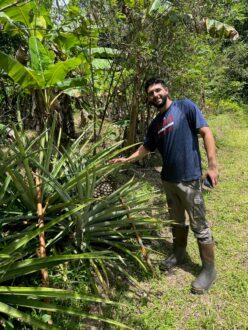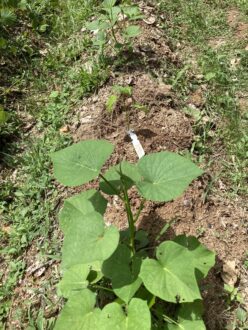UTUADO, Puerto Rico - Graduate student Joseph Anthony Navarro thinks that sustainable agroecological practices can preserve biodiversity and was awarded a $16,491 SSARE grant to research it. He asks the question, “Can Taino be an alternative to traditional intensive Agriculture?”
According to Joseph, a Conuco is an elevated bed of soil, organic matter, and plant/tree residues (mulch) for easy harvesting/weed management.
“My thesis aims to address Puerto Rico’s persistent food insecurity by advocating for the adoption of sustainable agroecological practices, inspired by Indigenous methods to combat erosion, and agricultural challenges while promoting self-reliance, ecological restoration, and sustainable food production in a region historically focused on plantation crops and facing economic and environmental consequences,” said Joseph Anthony Navarro.
Joseph is studying in the Master of Environmental Science program at Florida International University and is a Graduate Research Assistant with the Department of Earth & Environment’s Indigenous Agroforestry & Caribbean Ecology program. He has a particular interest in integrated silvopasture systems and Caribbean ecology.

Joseph hypothesizes that Taino methods may improve soil conditions in a depleted farm with increased crop production and plant health. He feels that indigenous agricultural practices, ranging from milpa farming to terraced agriculture, will offer crucial insights for implementing sustainable agroforestry systems in biodiverse regions like Puerto Rico, presenting a promising solution to food insecurity in tropical regions. He also thinks that Taino agricultural practices, consisting of conuco mound construction with organic matter and mulch, intercropped with sweet potato will provide erosion control and atmospheric nitrogen to soil. The SSARE grant will help him test his theories, providing valuable research results that could help farmers and communities in Puerto Rico and similar environments.
His research objectives include determining if the intercropping of Aji Dulce Peppers (Capsicum annuum) and sweet potato (Ipomoea batatas L.) will increase soil/plant health. He also intends to investigate the potential for sweet potato to mitigate the effects of erosion. This study will help him examine the feasibility of replication in distinct regional biomes of Puerto Rico and calculate yield for appropriate nutrition consumption for Puerto Rican families.
This project measures nutrient density, soil health, and plant health, replicating Indigenous methods, and using bat guano for fertilization to help restore the ecology in Puerto Rico by creating an integrated Agroforestry system.
The main crops he intends to use are tropical tubers such as malanga, cassava, taro, yautia, sweet potato, intercropped with maize, guava berries, aji dulce pepper, perennial peanut, culantro, tobacco, Cabezona pineapple, Caribbean pumpkin, intercropped with guavas, custard apple, and sugar apple to gauge growth environment.
In update meetings and visits with Joseph, he shared progress on the research trial project. The fruit trees established in Utuado have been doing very well. Utuado is the area with the most biologically active area, as was his hypothesis. He was having spotty germination and long growth periods on the Aji Dulce from seed, so he decided to purchase seedling trays with semi-mature plants to speed up the process.
“As a field study, there is always lots of uncertainty,” said Krish Jayachandran, one of Joseph’s advisors and an Environmental Microbiologist/Soil Scientist and Distinguished University Professor at Florida International University.
Jayachandran is also the co-founding director of the Agroecology Program in the Earth & Environment Department and mentors many graduate students on both thesis and dissertation work. “Not all master’s students do field studies because it takes time, but Joey is very focused and determined to do it,” he said.
As expected in research trials, climate and environmental challenges caused adjustments in part of the planned project, but Joseph and his advisors collaboratively decided on solutions to continue the work. With his expertise in soil biology, Jayachandran explained to Navarro how to regenerate the soil using an organic mix.
“I think that Joey has hit upon a really important topic,” said Cara Rockwell, another advisor to Joseph, who is an Assistant Professor at the Department of Earth and Environment at Florida International University. She is an applied forest ecologist who works in disturbed natural forest systems as well as urban agroforestry systems as lived in South America for fifteen years and has also worked in Brazil, Peru, French Guyana and the Bahamas.
“We have asked a lot of farmers to adapt to these bigger commercial systems forgetting about how we feed ourselves as a society and these diverse agroecology systems have not been forgotten but the idea has been neglected a bit. For me from a research perspective that is what interested me in wanting to support what he was doing,” said Rockwell.
In his latest update, Navarro said, “I took away one of my initial four sites because that site was on a hill and heavy rains eroded the backside out, so I lost some trees. I decided to keep it to just three sites, add one more control bed to each site and conduct two additional soil samples per bed (18 samples total per site).”
His site in Cayey suffered heavy sediment runoff and he lost some organic matter in the conucos from heavy rain, so Jayachandran and Rockwell recommended that he backfill the treatment plots with organic potting mix to help maintain the integrity of the beds.
Joseph’s study is expected to be reported in Fall of 2025 and will be publicly available for review in his final report. To learn more about this project and others funded by Southern SARE, visit https://projects.sare.org/search-projects/ to search all projects.
